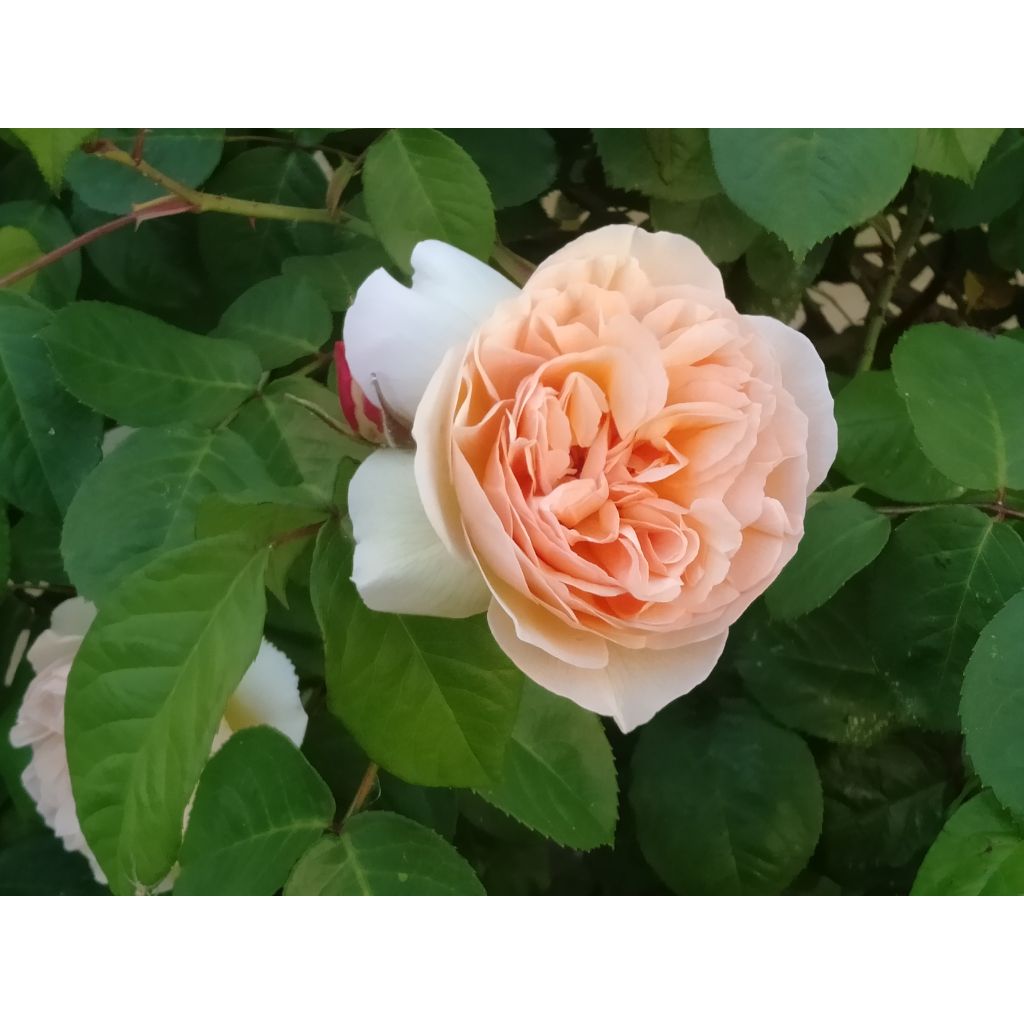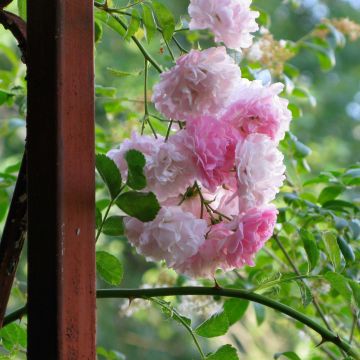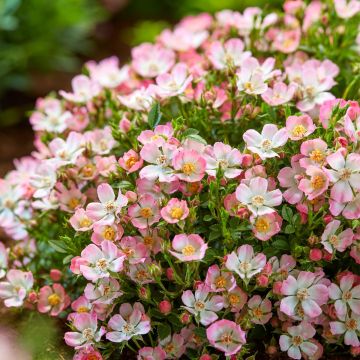

Rosa Sweet Juliet - English Shrub Rose


Rosa Sweet Juliet - English Shrub Rose
Rosa Sweet Juliet - English Shrub Rose
Rosa Sweet Juliet® 'Ausleap'
This plant carries a 24 months recovery warranty
More information
We guarantee the quality of our plants for a full growing cycle, and will replace at our expense any plant that fails to recover under normal climatic and planting conditions.
From €5.90 for pickup delivery and €6.90 for home delivery
Express home delivery from €8.90.
From €5.90 for pickup delivery and €6.90 for home delivery
Express home delivery from €8.90.
Delivery to Corse prohibited: UE law prohibits the import of this plant from mainland France to Corse as part of the fight against Xylella fastidiosa. Please accept our sincere apologies.
More information
Does this plant fit my garden?
Set up your Plantfit profile →
Description
The Sweet Juliet rose is a beautiful creation by David Austin. Vigorous and healthy, this beautiful bush rose blooms late in the season and its old-fashioned roses, dense and richly coloured in soft apricot pink fading to white pink, also offer an intense fragrance of Tea Rose. This beautiful variety can be used as a background bush, in a small flowering hedge, or a romantic border. A reliable choice that will delight English rose enthusiasts!
The Sweet Juliet rose is a shrub rose that will reach about 1.50 m (5ft) in height and 1.25 m (4ft) in width within 5-6 years. It produces numerous vertical branches from its base. Its stems are thorny. The young shoots are coloured in red, which develop into fairly dark green leaves divided into 3 to 5 toothed leaflets. This foliage withstands black spot well, but can be slightly sensitive to powdery mildew in wetter climates. Deciduous, leaves fall in autumn. 'Sweet Juliet' blooms in successive waves between May-June and October-November, until the first frosts. Its flowers are solitary or grouped in threes. Medium-sized, 7-8 cm (3in), they are cup-shaped, double, quite heavy, but resistant to rain. Their colour varies depending on the temperature. The heart of the rose is tinged with peach and apricot on an orange background, gradually fading from the periphery to become more pink, then white pink. Their Tea Rose fragrance is strong, delightfully fresh, revealing lemony notes as they bloom. English roses thrive in rich soils that do not dry out too much in summer: in fact, while the plant itself tolerates summer drought well, it stops flowering when it lacks water. In this case, flowering resumes with the return of rain, sometimes until Christmas in milder climates.
The Sweet Juliet rose, with the authentic charm of English roses, is a variety made for romantic spots in the garden, alongside annual delphiniums, perennial geraniums, or nepetas, for example. It will also add a beautiful floral touch to shrub borders. To accompany it, consider a white David Austin rose or a purple one. It also looks stunning with lilacs and the purple foliage of the Sambucus Black Lace . Gypsophila Pacific and Crambe cordifolia also make a perfect pairing with roses.
Bred by David Austin in 1989.
Report an error about the product description
Rosa Sweet Juliet - English Shrub Rose in pictures


Plant habit
Flowering
Foliage
Botanical data
Rosa
Sweet Juliet® 'Ausleap'
Rosaceae
Cultivar or hybrid
Rosa canina Laxa (Wrapped bare root)
Other Traditional Roses
Planting and care
An excellent variety whose flowering does not stop until the frosts arrive if you take care to remove faded flowers as they appear and if the plant does not lack water in summer. Plant this rose bush in well-prepared soil, in a mixture of potting compost and garden soil. Dig a good planting hole. Water generously at planting, then again 2 days later. Water in the case of a very dry summer if you do not want the flowers to wither. Apply special rose fertiliser every year in late winter.
Rose bushes are often spotted or ugly at the end of summer, but it is not a problem for their development. These spots are not harmful to the rose bush, it is a natural phenomenon.
Planting period
Intended location
Care
This item has not been reviewed yet - be the first to leave a review about it.
Haven't found what you were looking for?
Hardiness is the lowest winter temperature a plant can endure without suffering serious damage or even dying. However, hardiness is affected by location (a sheltered area, such as a patio), protection (winter cover) and soil type (hardiness is improved by well-drained soil).

Photo Sharing Terms & Conditions
In order to encourage gardeners to interact and share their experiences, Promesse de fleurs offers various media enabling content to be uploaded onto its Site - in particular via the ‘Photo sharing’ module.
The User agrees to refrain from:
- Posting any content that is illegal, prejudicial, insulting, racist, inciteful to hatred, revisionist, contrary to public decency, that infringes on privacy or on the privacy rights of third parties, in particular the publicity rights of persons and goods, intellectual property rights, or the right to privacy.
- Submitting content on behalf of a third party;
- Impersonate the identity of a third party and/or publish any personal information about a third party;
In general, the User undertakes to refrain from any unethical behaviour.
All Content (in particular text, comments, files, images, photos, videos, creative works, etc.), which may be subject to property or intellectual property rights, image or other private rights, shall remain the property of the User, subject to the limited rights granted by the terms of the licence granted by Promesse de fleurs as stated below. Users are at liberty to publish or not to publish such Content on the Site, notably via the ‘Photo Sharing’ facility, and accept that this Content shall be made public and freely accessible, notably on the Internet.
Users further acknowledge, undertake to have ,and guarantee that they hold all necessary rights and permissions to publish such material on the Site, in particular with regard to the legislation in force pertaining to any privacy, property, intellectual property, image, or contractual rights, or rights of any other nature. By publishing such Content on the Site, Users acknowledge accepting full liability as publishers of the Content within the meaning of the law, and grant Promesse de fleurs, free of charge, an inclusive, worldwide licence for the said Content for the entire duration of its publication, including all reproduction, representation, up/downloading, displaying, performing, transmission, and storage rights.
Users also grant permission for their name to be linked to the Content and accept that this link may not always be made available.
By engaging in posting material, Users consent to their Content becoming automatically accessible on the Internet, in particular on other sites and/or blogs and/or web pages of the Promesse de fleurs site, including in particular social pages and the Promesse de fleurs catalogue.
Users may secure the removal of entrusted content free of charge by issuing a simple request via our contact form.
The flowering period indicated on our website applies to countries and regions located in USDA zone 8 (France, the United Kingdom, Ireland, the Netherlands, etc.)
It will vary according to where you live:
- In zones 9 to 10 (Italy, Spain, Greece, etc.), flowering will occur about 2 to 4 weeks earlier.
- In zones 6 to 7 (Germany, Poland, Slovenia, and lower mountainous regions), flowering will be delayed by 2 to 3 weeks.
- In zone 5 (Central Europe, Scandinavia), blooming will be delayed by 3 to 5 weeks.
In temperate climates, pruning of spring-flowering shrubs (forsythia, spireas, etc.) should be done just after flowering.
Pruning of summer-flowering shrubs (Indian Lilac, Perovskia, etc.) can be done in winter or spring.
In cold regions as well as with frost-sensitive plants, avoid pruning too early when severe frosts may still occur.
The planting period indicated on our website applies to countries and regions located in USDA zone 8 (France, United Kingdom, Ireland, Netherlands).
It will vary according to where you live:
- In Mediterranean zones (Marseille, Madrid, Milan, etc.), autumn and winter are the best planting periods.
- In continental zones (Strasbourg, Munich, Vienna, etc.), delay planting by 2 to 3 weeks in spring and bring it forward by 2 to 4 weeks in autumn.
- In mountainous regions (the Alps, Pyrenees, Carpathians, etc.), it is best to plant in late spring (May-June) or late summer (August-September).
The harvesting period indicated on our website applies to countries and regions in USDA zone 8 (France, England, Ireland, the Netherlands).
In colder areas (Scandinavia, Poland, Austria...) fruit and vegetable harvests are likely to be delayed by 3-4 weeks.
In warmer areas (Italy, Spain, Greece, etc.), harvesting will probably take place earlier, depending on weather conditions.
The sowing periods indicated on our website apply to countries and regions within USDA Zone 8 (France, UK, Ireland, Netherlands).
In colder areas (Scandinavia, Poland, Austria...), delay any outdoor sowing by 3-4 weeks, or sow under glass.
In warmer climes (Italy, Spain, Greece, etc.), bring outdoor sowing forward by a few weeks.











































